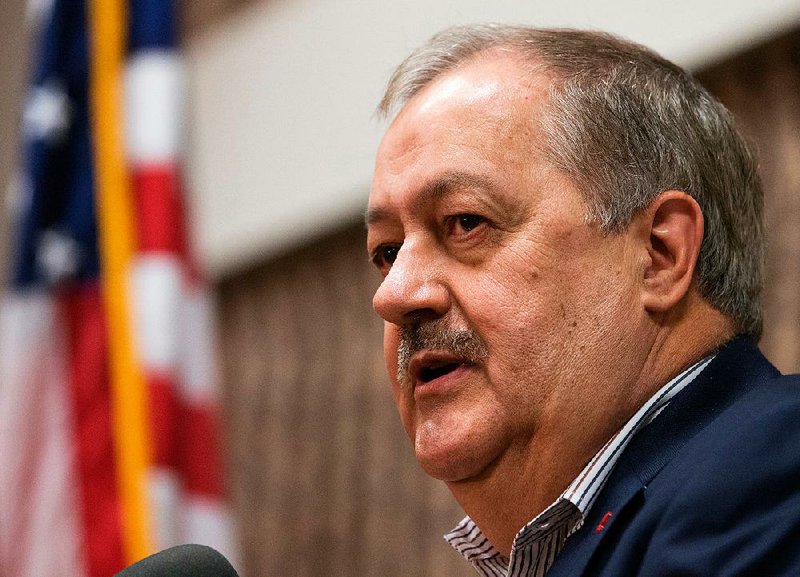HUNTINGTON, W.Va. -- Republican Don Blankenship doesn't care if his party and his president don't think he can beat Democratic Sen. Joe Manchin this fall.
This former coal mining executive, an ex-convict released from prison less than a year ago, says he is willing to risk his personal fortune and the GOP's golden opportunity in West Virginia for the chance to prove them all wrong.
"I'll get elected on my own merits," Blankenship said.
There aren't a lot of things that can sink Republicans' hopes in the red state that Donald Trump won by 42 percentage points in 2016, but Blankenship could well be one.
His candidacy worries Republicans, who are furiously working to ensure he is not their choice to take on Manchin in November. While Blankenship's bid is a long shot, he's testing whether a party led by an anti-establishment outsider can rein in its anti-establishment impulses.
"The establishment, no matter who you define it as, has not been creating jobs in West Virginia," Blankenship said at a primary debate last week.
Even before Blankenship emerged as a legitimate Republican candidate, West Virginia was a worry for some Republicans.
Former Gov. Manchin has held elected office in West Virginia for the better part of the past three decades, and he has worked hard to cozy up to Trump and nurture a bipartisan brand.
He has voted with the Republican president more than he has opposed him, his office says, noting that the senator and Trump have collaborated on trade, environmental rules, gun violence and court nominations.
The alignment with Trump was so effective that former White House adviser Steve Bannon worried privately to colleagues that Trump might actually endorse the Democrat. An outright endorsement now is unlikely, but a Blankenship primary victory on May 8 could push Trump to help Manchin, at least indirectly, by ignoring West Virginia this fall.
The state has long been considered a prime pickup opportunity for Republicans, who hold a two-seat Senate majority that suddenly feels less secure given signs of Democratic momentum in Nevada, Arizona, Tennessee and elsewhere. If Democrats can win West Virginia, which gave Trump his largest margin of victory in the nation, they increase their slim chance at seizing the Senate majority.
Some of Trump's most prominent conservative supporters, particularly those in Bannon's network, have rallied behind state Attorney General Patrick Morrisey, a former Capitol Hill aide who was raised in New Jersey but has served as West Virginia's top lawyer since 2013.
Rep. Evan Jenkins, a former Democrat, has highlighted his West Virginia roots and deep allegiance to Trump. Jenkins noted that Manchin missed a big chance to align himself with Trump on key issues such as taxes and health care.
"The president gave Joe Manchin every opportunity in the early weeks and months of his administration to vote the right way," Jenkins said in an interview. "He voted wrong."
But in interviews last week, Morrisey and Jenkins declined to attack Blankenship for his role in the 2010 Upper Big Branch mine disaster, the deadliest U.S. mine disaster in four decades, which killed 29 men. Blankenship led the company that owned the mine and was sentenced to a year in prison for conspiring to break safety laws, a misdemeanor.
Raising that history has been left to the national GOP forces believed to be behind the Mountain Families PAC, an organization created last month that has invested more than $700,000 attacking Blankenship on television. A spokesman for the Senate GOP's most powerful super PAC declined to confirm or deny a connection to the group.
For voters, Blankenship remains a deeply polarizing figure.
Blankenship calls himself a West Virginian but had his supervised release transferred in August to federal officials in Nevada, where he has a six-bedroom home with his fiancee 20 miles from Las Vegas, in Henderson.
"It's a friendly place and I like it," said Blankenship, whose supervised release ends May 9, the day after the primary.
Blankenship recently drew attention for comments on a radio show about the father of Transportation Secretary Elaine Chao, who is married to Senate Majority Leader Mitch McConnell, R-Ky. Blankenship said he believed McConnell has a conflict of interest in foreign relations matters, in particular those dealing with China. Chao's father was born in China and started an international shipping company in New York.
Stanley Stewart, a retired miner who was inside the Upper Big Branch mine when it blew up in 2010, calls Blankenship 'ruthless, cold-blooded, cold-hearted, self-centered."
"I feel that if anybody voted for Don Blankenship, they may as well stick a knife in their back and twist it, because that's exactly what he'll do," Stewart said in an interview.
But there is skepticism that Blankenship was treated fairly by the courts. Blankenship has cast himself as a victim of an overbearing President Barack Obama administration, an argument that resonates with many white working-class voters here. Nonetheless, the Supreme Court last October left in place his conviction when the justices declined to take up his case.
"What they've said he's actually done [in the criminal case], I don't believe none of that," 21-year-old coal mechanic Zack Ball said. "Don Blankenship all the way."
A Section on 04/29/2018

